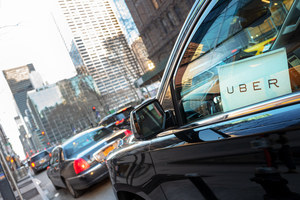 Uber offers a life ring. This is a hard choice. The District Court for the Northern District of California seems to be eyeing the life ring.
Uber offers a life ring. This is a hard choice. The District Court for the Northern District of California seems to be eyeing the life ring.Capriole v. Uber Technologies Inc.
Capriole, originally filed in Massachusetts federal court, has now been transferred to the Northern District of California, where it joins several virtually identical lawsuits. The gig drivers are represented by the same law firm. Collectively, the lawsuits name both Uber and Lyft as defendants.
Capriole argues that Uber misclassifies its drivers as independent contractors when they should be classified as employees under Massachusetts law. The same argument has been advanced based on the provisions of California labor law. Uber fails to provide its drivers with paid sick leave.
Further, the harm caused by misclassification extends not only to the drivers, but to the public as the world faces a crisis in the spread of COVID-19. Uber drivers, confronted with the choice of staying home without pay and risking losing their livelihood, housing, food, and other necessities, continue to work and risk exposing hundreds of riders every week.
Before the lawsuit was transferred, the drivers sought a preliminary injunction that would have required Uber to reclassify the drivers as employees and to comply with wage laws, including those that require paid sick leave.
The plaintiffs’ application argued that Uber’s misclassification of the drivers “degrades the entire economy,” causes lost tax revenue, and harms other businesses who classify their workers properly. It emphasized that the injunction was “in the nature of a public injunction” and was not solely for John Capriole’s benefit or the benefit of other Uber drivers. It urged the court to adopt California case law as precedent. The Massachusetts court denied the application, finding insufficient evidence of the risk of irreparable harm.
It has since been renewed as an emergency motion in the Northern District of California. Judge Edward Chen has ordered the parties to begin negotiations in order to craft a temporary solution.
The life ring
On April 10, Uber updated a financial assistance policy for active drivers during the pandemic. Drivers can take advantage of up to 14 days of financial assistance if they are diagnosed with COVID-19; placed in quarantine or asked to self-isolate by a public health authority or licensed medical provider; or if their account is restricted by Uber after a public health authority has indicated a driver has been exposed to someone diagnosed with COVID-19. The financial assistance offered is subject to certain individual geographically-specific caps.
Uber’s policy is more generous than California law in terms of time. However, eligibility appears to be more restrictive. It is not clear how Uber’s policy will impact the protections of California law or the federal CARES Act.
It is also not clear whether the updated policy will satisfy the requirements of Judge Chen, who suggested that one solution might include allowing drivers to self-certify about their symptoms.
The upstream argument
The drivers have, at least preliminarily, rejected this compromise, making the case that this does not solve the underlying problem. They argue that the issue is not the narrow question of whether they are sick, but whether, under existing provisions of state law, they are entitled to wages and other benefits of employment.
The financial assistance offered by Uber may be no more than a “band aid” that ultimately prevents or delays the resolution of larger problem. It is worth noting, as well, that the announced policy is unilateral. It could be altered or revoked by Uber at will and without the benefit of negotiation with the drivers. That may be too much to give up for quick cash.
READ MORE CALIFORNIA LABOR LAW LEGAL NEWS
That may be the background to recent comments by Dara Kosrowshahi, President and CEO of Uber. Kosrowshahi has reportedly argued that the problem is that health insurance is tied to W-2 employment. Untying the two might solve the problem. But that solution lies even farther upstream; that bridge is a long way away.
